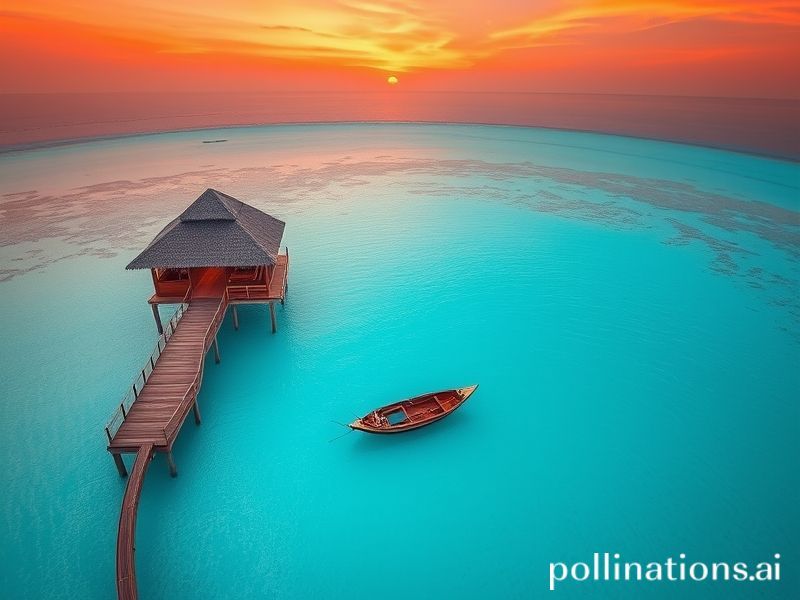Sinking Luxury: How the Maldives Became the World’s Most Beautiful Expiration Date
The Maldives, that necklace of coral atolls tossed across the Indian Ocean like a billionaire’s broken bracelet, has always punched above its weight in the apocalypse sweepstakes. While other nations merely flirt with existential doom, the Maldives brings a dowry of 1,192 islands, an average elevation you could clear with a decent jump shot, and a president who once held an underwater cabinet meeting to remind the world that, yes, we are all quite literally in the same sinking boat. The stunt was dismissed as gimmickry by diplomats who prefer their metaphors less damp, yet eight years later the waterline has crept up another centimeter, the bureaucrats are still arguing over commas in climate communiqués, and the coral is bleaching faster than a Stockholm teenager’s hair.
Globally, the archipelago functions as a kind of luxury barometer: when the ultra-rich start snapping up entire islands to escape the rest of us, you know the end is nigh but priced per night. Russian oligarchs, Saudi princes, and Silicon Valley apostles of “innovation” dock their super-yachts in lagoons so pristine it would make a UNESCO official weep into his sustainable seafood. They sip $400 cocktails garnished with endangered sea salt while their security details scan the horizon for pirates, paparazzi, or—more unthinkable—poor people. The irony, of course, is that the same carbon-intensive lifestyle that funds these escapist fantasies is the one ensuring the sandbars will vanish before the mortgage does, leaving nothing but a floating Rolex memorial to hubris.
Meanwhile, China and India play geopolitical Marco Polo around the islands, lending airports, bridges, and debt in proportions that would make a Mafia loan shark blush. Beijing’s “String of Pearls” strategy—sounds lovely, like a honeymoon itinerary—has Washington muttering about “debt-trap diplomacy” between bites of freedom fries. The Maldivian dance of switching patrons every election cycle has become so routine that foreign ministries simply keep two pre-written press releases in the drawer: “Deepening Historic Ties” and “Reviewing Strategic Partnership,” ready to swap the nouns as power oscillates between Male’s pro-China and pro-India factions like a very expensive pendulum powered by LNG.
For the average Maldivian—yes, 515,000 humans actually live here, not just honeymooners and Bond villains—the international tug-of-war plays out in more prosaic ways: Chinese cranes blocking sunset views, Indian nurses keeping the only hospital running, and a currency that wobbles every time a central banker in Brussels sneezes. Youth unemployment hovers around 30 percent, giving paradise the same restless energy found in every other seaside slum, except here the backdrop is a postcard and the soundtrack is waves slapping against plastic bottles someone else shipped in from Jakarta.
Tourism ministries market the place as “the last paradise,” a slogan that manages to be both accurate and ominous. Paradise lasts right up until the moment it doesn’t; then it becomes an Atlantis-themed amusement park for future divers wondering whose flip-flop this is. The Maldives is simply the canary in the global coal mine, except the canary has five-star spas and charges you for the privilege of watching it suffocate. If we can’t save a country whose GDP depends on people flying 10,000 kilometers to gawk at manta rays, what hope is there for less photogenic disasters—say, Bangladesh, or downtown Miami?
Still, the islands keep appearing on bucket lists, because nothing says “carpe diem” like snapping a sunset selfie on land scheduled for submersion. The existential threat is, paradoxically, fabulous branding: limited-time offer, book now, prices rise with the tide. It’s disaster capitalism with a tropical cocktail umbrella, and we are all, in some sense, enthusiastic customers. So here’s to the Maldives—teaching the world that you can indeed put a price on beauty, and a sell-by date on civilization, while supplies last.







